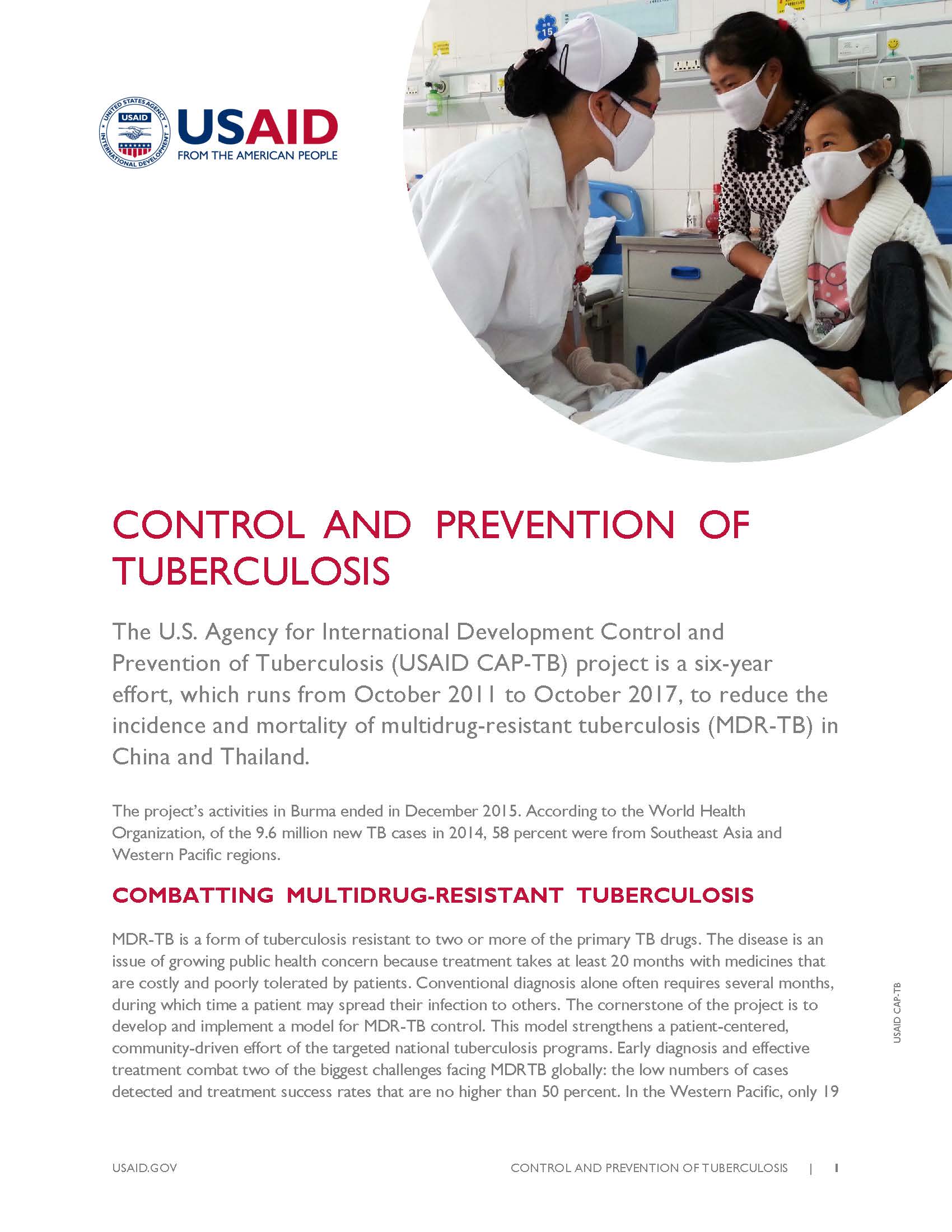Control and Prevention of Tuberculosis Project ![]() (pdf - 257k)
(pdf - 257k)
The U.S. Agency for International Development Control and Prevention of Tuberculosis (USAID CAP-TB) project is a six-year effort, which runs from October 2011 to October 2017, to reduce the incidence and mortality of multidrug-resistant tuberculosis (MDR-TB) in China and Thailand. The project’s activities in Burma ended in December 2015. According to the World Health Organization, of the 9.6 million new TB cases in 2014, 58 percent were from Southeast Asia and Western Pacific regions.
DIAGNOSING & TREATING MULTIDRUG-RESISTANT TUBERCULOSIS
MDR-TB is a form of tuberculosis resistant to two or more of the primary TB drugs. The disease is an issue of growing public health concern because treatment takes at least 20 months with medicines that are costly and poorly tolerated by patients. Conventional diagnosis alone often requires several months, during which time a patient may spread their infection to others.
The cornerstone of the project is to develop and implement a model for MDR-TB control. This model strengthens a patient-centered, community-driven effort of the targeted national tuberculosis programs. Early diagnosis and effective treatment combat two of the biggest challenges facing MDR-TB globally: the low numbers of cases detected and treatment success rates that are no higher than 50 percent. In the Western Pacific, only 19 percent of the estimated MDR-TB cases were notified in 2014 and in Southeast Asia, 34 percent of the estimated MDR-TB cases were notified in 2014. MDR-TB treatment success was 48 percent for the Southeast Asia region and 51 percent for the Western Pacific region.
IMPACT AND RESULTS
In Burma, from 2011 to 2015, over 600 patients received support to complete their treatment with a success rate of 88 percent, far surpassing the global average of 50 percent and the World Health Organization’s standard for MDR-TB. The project’s model is now being scaled up in areas of the country with the highest burden of MDR-TB, under a separate initiative.
In China, USAID CAP-TB’s model has introduced social media and peer counselors to support patients, changing how healthcare providers and patients tackle the disease. With the project’s support, MDR-TB patients in Yunnan Province have treatment success rates that are much higher than the China national average. Provinces around the country have requested support to introduce these interventions. Tthe project’s model is recognized at the national level.
In Thailand, similar to Burma and China, USAID CAP-TB supports provinces to achieve success rates that surpass the national average. The project team is also helping Thailand’s Bureau of Tuberculosis to introduce bedaquiline for the treatment of extensively drug-resistant tuberculosis. This is the first new drug in Thailand to combat TB in nearly 45 years; it is specifically approved for MDR-TB. The USAID-Janssen Bedaquiline Donation Program has provided the drug free of charge to the country to treat patients with extensively drug-resistant TB.
PARTNERS
USAID partners with FHI 360, the International Union Against Tuberculosis and Lung Disease, national tuberculosis programs, and local governmental and nongovernmental organizations in the Greater Mekong Subregion.
Click here for the pdf version.








Comment
Make a general inquiry or suggest an improvement.